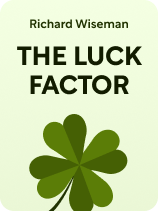

This article is an excerpt from the Shortform book guide to "The Luck Factor" by Richard Wiseman. Shortform has the world's best summaries and analyses of books you should be reading.
Like this article? Sign up for a free trial here.
What’s the psychology behind following your gut? How is intuition like a muscle?
We’ve all been told to “trust your gut feeling” at some point in our lives. Psychologist Richard Wiseman explains why this is important and why you should never ignore warning signals.
Continue reading to learn more about following your gut, from the book The Luck Factor.
Trusting Your Feelings
People who think of themselves as lucky tend to trust their intuition more than those who don’t. As a result, they enhance their luck by making, on average, better decisions—both in their personal and professional lives—and are more likely to engage in activities that improve their intuitive skills.
Wiseman says there’s nothing magical about intuition and gut feelings. Rather, hunches and instincts are often the result of your brain’s unconscious pattern recognition skills. A great deal of psychological research has shown that our unconscious minds influence our choices, and our brains developed to work that way for a reason. Intuitive hunches are one way that our brains streamline the decision-making process, and Wiseman’s research found that unlucky people often ignore the warning signals their intuition sends them, whereas people who seem to have luck on their side are more willing to follow their instincts.
(Shortform note: Intuition is a powerful tool, but the drawback is that it isn’t always right. In Blink, Malcolm Gladwell explains that intuition works when your unconscious mind finds patterns based on small snapshots of experience while ignoring superficial details. However, Gladwell says that intuition backfires when your unconscious gets distracted by superficial details, such as deciding that someone is trustworthy because they’re wearing a nice suit. In this way, intuition lets us fall prey to biases we don’t even know we have. Wiseman’s findings reflect that intuition works more often than not, hence the evolutionary advantage it gives our species, but it isn’t 100%—you still have to balance intuition with logic.)
Wiseman cites numerous case studies demonstrating that people who follow their hunches fare better in personal relationships, career choices, and financial decisions. For instance, if you meet someone on a blind date, you may immediately feel an energetic connection—or you might feel that something’s “off” about the person. The same scenario may come up during a job interview—you might get a positive feeling about the other person, or something in the back of your mind might tell you that they’re not someone you want to work with. When following these hunches leads to a good decision, you might attribute your outcomes to luck when in fact your unconscious was just doing its job.
(Shortform note: Though Wiseman focuses on intuition’s “positive” hunches, it may be that your intuition’s warnings are more accurate. In The Gift of Fear, Gavin de Becker argues that human intuition developed specifically to protect us from harm. He differentiates between fear—your instinctive response to threats—and general anxiety, which has its roots in the rational mind and isn’t linked to immediate danger. Whereas Wiseman focuses on listening to your intuition, de Becker suggests that you can deliberately trigger it—for instance, by talking about sensitive subjects and seeing how other people respond. Their reactions give your intuition something to analyze—such as whether you can trust a financial adviser or someone you met on a date—protecting you from the harm, or bad luck, that a stranger may bring.)
Intuition Is a Muscle
Unconscious intuition—like any other skill—requires exercise and practice to grow stronger. In his research, Wiseman discovered that in addition to using their intuition more frequently, lucky people actively take steps to enhance their intuition, whether they realize it or not. They do this by practicing meditation, finding quiet places for contemplation, and regularly clearing their minds in other ways to boost their intuitive skills. In surveys, these individuals report how these techniques have improved their decision-making abilities and overall luck in various aspects of their lives. Therefore, Wiseman concludes that lucky people treat their intuition as a valuable tool and make a point of fostering and listening to their feelings.
(Shortform note: Wiseman’s methods for improving intuition all involve activities we normally think of as relaxing, but in Ultralearning, Scott Young suggests a different approach. He writes that our conscious minds often fixate on surface-level aspects of a problem, and that you can train your intuition to delve into deeper knowledge by challenging your mind instead of relaxing it. You can do this by forcing yourself to struggle when you encounter a difficult problem, questioning what you think you know, and connecting abstract information to concrete examples. For instance, to develop an intuitive mental map of a new city, you should force yourself to work out directions to specific destinations without relying on your phone’s GPS.)

———End of Preview———
Like what you just read? Read the rest of the world's best book summary and analysis of Richard Wiseman's "The Luck Factor" at Shortform.
Here's what you'll find in our full The Luck Factor summary:
- The unconscious methods lucky people use
- The benefits of trusting your intuitive hunches
- The scientific explanation as to whether or not luck is real






